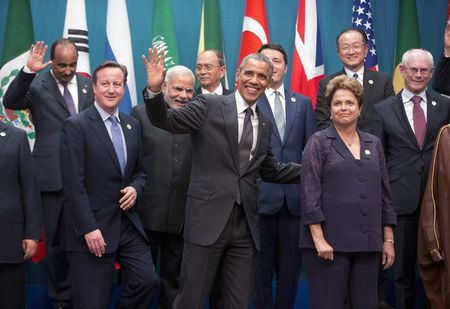By Anthony Boadle
BRASILIA (Reuters) - Brazil's President Dilma Rousseff, who cancelled a White House trip last year in anger over U.S. spying revelations, now wants to improve ties and reschedule the state visit - but some U.S. officials warn it might not be that easy.
A debate in Washington over whether and when to re-extend the invitation to Rousseff reflects persistent diplomatic strains between the Americas' two largest economies, which have long struggled with different philosophies on trade how to handle regional flashpoints such as Venezuela and Cuba.
Shortly after being re-elected to a second term on Oct. 26, Rousseff told U.S. Vice President Joe Biden by phone that she wanted to restart discussions "right away" for a formal state visit, according to a statement from her office.
Such an event includes a banquet at the White House, and there are typically only one or two a year.
Some U.S. officials told Reuters they are eager to go ahead with Rousseff's trip, which was originally conceived as a way to celebrate Brazil's robust democracy and help pry open its $2.1 trillion (1.34 trillion pounds) economy, one of the world's most closed to trade.
Yet others argue that the leftist Rousseff must first show she is willing to advance on trade and investment treaties, since state visits are almost always accompanied by a robust flurry of bilateral deals.
"There's just so little substance to hang this on," one U.S. official said on condition of anonymity. "Until we advance on that, I don't think you'll see us set a date."
Rousseff became one of the only leaders ever to cancel a state visit to Washington in October 2013, following revelations that the U.S. National Security Agency spied on her and millions of other Brazilians.
The scandal also led Rousseff to abandon plans to buy F-18 jets from Boeing Co. Brazil purchased $5.4 billion in planes from Sweden instead.
Since then, diplomats on both sides have worked to ease tensions. Brazil's stagnant economy, which has suffered from falling investor confidence and a rising trade deficit, has also given Rousseff greater incentive to try to improve ties with the country's second-biggest trade partner behind China.
Biden is expected to interrupt his vacation to attend Rousseff's inauguration on Jan. 1.
"Relations have gone from cold to tepid, and are warming now," a Brazilian government official said.
CONFLICTS
Foreign policy is not a top priority for Rousseff. Since taking office in 2011, she has spent less energy than her predecessor on building ties with Africa and other Latin American countries.
In fact, before last year's clash, her efforts to improve ties with Washington were arguably her main accomplishment abroad. She often told U.S. officials that their country had the kind of middle-class society she wanted Brazil to emulate, and that U.S. technology and investment could help.
Yet Rousseff has made decisions that antagonized the United States. She ordered Brazilian diplomats in March to abstain on a United Nations resolution that criticized Russian annexation of Crimea. In September, she criticized U.S. air strikes against the Islamic State because they were not authorized by the U.N.
Those positions have fed a belief that Brazil is more aligned with leftist, anti-U.S. countries in Latin America such as Venezuela and Argentina. Many in Brasilia, meanwhile, grumble that the United States will never treat Brazil as an equal partner or negotiate deals accordingly.
The biggest sticking point, as well as the area that holds the most promise, is trade.
Brazil and the United States traded $71 billion in goods last year, small considering that Brazil has some 200 million people and a voracious consumer class.
Brazil's membership of South American trade bloc Mercosur, which also includes Argentina and Venezuela, prevents it from seeking trade pacts on its own with other nations.
Many Brazilian executives want Rousseff to boost trade and believe a visit to Washington is the best way to do so.
"We hope the state visit happens sooner rather than later because it will be a catalyst for improved relations," said Frederico Curado, CEO of Embraer SA, the world's third-largest commercial planemaker. The U.S. market accounts for one third of Embraer's sales.
In signs of thawing ties, the countries signed a long-awaited tax information exchange agreement in September. Washington also agreed to pay Brazilian cotton producers $300 million to end a dispute over subsidies.
Michael Shifter, of the InterAmerican Dialogue think tank in Washington, said the two countries are unlikely to become strategic partners soon.

"But Rousseff understands the relationship got off track and became very sour," he said, "and that is not helpful for what she needs to do to jumpstart the Brazilian economy."
(Additional reporting by Brian Winter in Sao Paulo; Editing by Kieran Murray)
